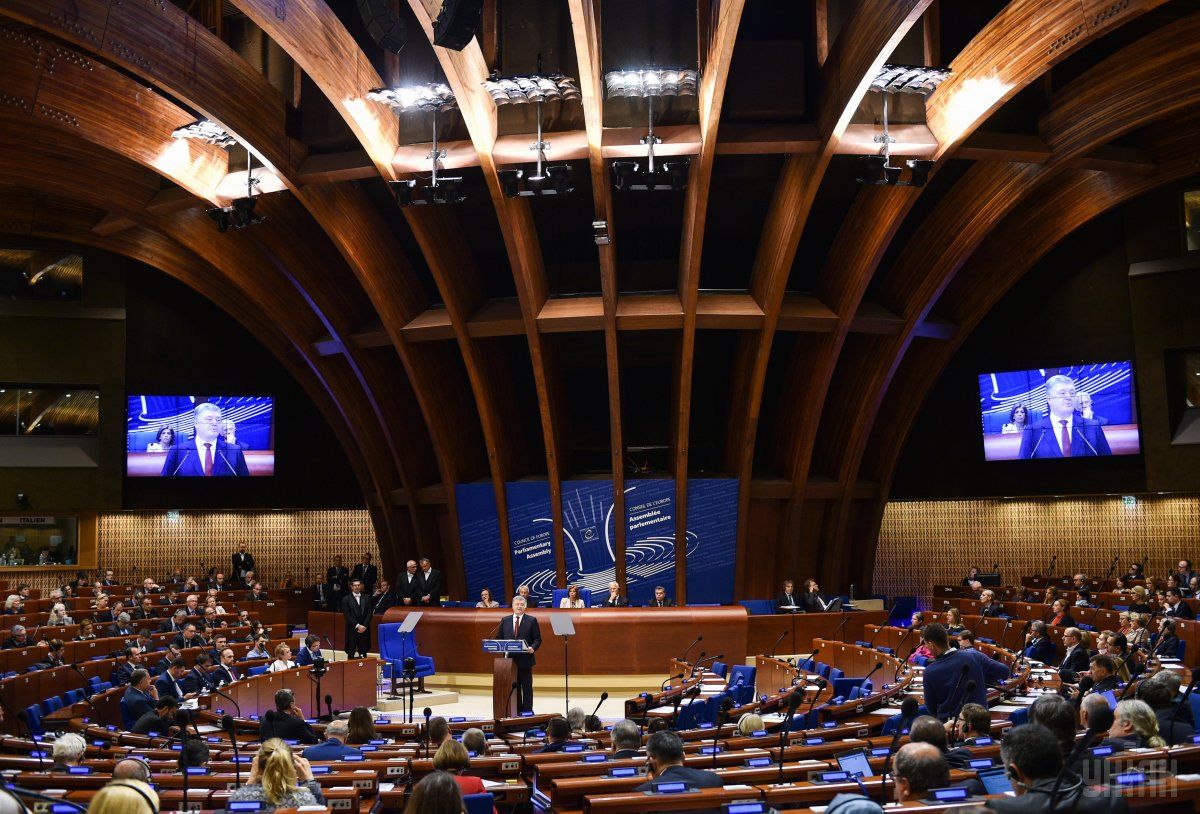
The relevant resolution was supported by 82 delegates, 17 abstained, and 11 people voted against it.
Before voting, many amendments were had been submitted to the draft resolution. Proposals for amendments were not made public before the vote. Not all amendments were clearly voiced during the debate.
Read alsoLatest PACE resolution does not guarantee Russia’s return – Ukrainian envoy"The Parliamentary Assembly is concerned about the new Education Act adopted on 5 September 2017 by the Ukrainian Verkhovna Rada (Ukrainian Parliament) and signed on 27 September 2017 by the Ukrainian President, Petro Poroshenko. Various neighboring countries claimed that this act infringes the right of national minorities and raises sensitive legal issues also under the Ukrainian legal order. In this respect, the Assembly notes that the Ukrainian authorities have submitted the text of the Education Act to the European Commission for Democracy through Law (Venice Commission) for an opinion, which shall be delivered by the end of 2017; however, the Assembly expresses dissatisfaction that this step was not taken before the adoption of the Education Act," the resolution draft said.
"Under these circumstances, the Assembly considers it premature to take a stand on any legal issue. However, the Assembly believes that it is important to fulfill the commitments based on the European Convention on Human Rights (ETS No. 5), the Framework Convention for the Protection of National Minorities (ETS No. 157, 'Framework Convention'), and the European Charter for Regional or Minority Languages, and to help re-establish a constructive dialogue between the different parties concerned. In this respect, for the Assembly, three interconnected principles must guide the stakeholders towards more consensual arrangements."
The first one is that knowledge of the official language of a State is a factor of social cohesion and integration and it is legitimate for States to promote the learning of the official language and to ask that the State language be a language of education for all.
Read alsoPoroshenko defends education law in PACEThe second one is that, as stated by the Advisory Committee on the Framework Convention: "Language is an essential component of individual and collective identity. For many persons belonging to national minorities, language is one of the main factors of their minority identity and identification." Thus, where States take measures to promote the official language, these must go hand in hand with measures to protect and promote the languages of national minorities. If this is not done, the result will be assimilation, not integration.
The third one is the principle of non-discrimination. This principle not only applies to the recognition and effective protection of the rights of minorities, as enshrined in the Framework Convention, and of the specific rights enshrined in the European Charter for Regional or Minority Languages, but also to "the enjoyment of any right set forth by law" according to Article 1 of Protocol No. 12 to the European Convention on Human Rights (ETS No. 177).
Read alsoBulgarian minority in Ukraine approves of new education law in UkraineFor the Assembly, these three principles are essential elements of a wider concept of utmost importance, which in fact underpins the entire Framework Convention: the concept of "living together". Based on the above-mentioned principles and the encompassing concept of "living together", the new legislation does not appear to strike an appropriate balance between the official language and the languages of national minorities.
"In particular, the new law entails a heavy reduction in the rights previously recognized to 'national minorities' concerning their own language of education," PACE said.
"The Assembly therefore recommends that the Ukrainian authorities reconsider the issue of education in the language of minorities, having as a reference a flexible model of bilingual education for all persons belonging to 'indigenous nations of Ukraine' and 'national minorities', with no discrimination. In concrete terms, a possible benchmark could be at least 60% of education curricula in the Ukrainian language and up to 40% in the language of the minority," reads the resolution.
It is also reported that in planning the implementation of the reform, flexibility should be ensured to avoid hasty changes prejudicing the quality of education provided to school and university students belonging to national minorities.
In this respect, a three-year transitional period may prove to be too short. Therefore, the Assembly urges the Ukrainian authorities to also introduce flexibility regarding the length of the process and allow for arrangements tailored to the concrete circumstances of the communities concerned and the situation in different areas.
As UNIAN reported earlier, on September 25, President Poroshenko signed the law on education. Its Article 7 on the language of command in Ukraine became a matter of concern for several EU countries: Poland, Romania, Hungary, Greece, and Bulgaria.
The new law introduces a 12-year secondary education, while the language of command in educational facilities shall be Ukrainian.
Petro Poroshenko instructed the foreign ministry and the ministry of education and science to hold necessary consultations with the European partners, including the Council of Europe.
On September 28, Pavlo Klimkin submitted Article 7 of the new law for the assessment by the Venice Commission. The Commission will have issued an opinion on the matter by December.

